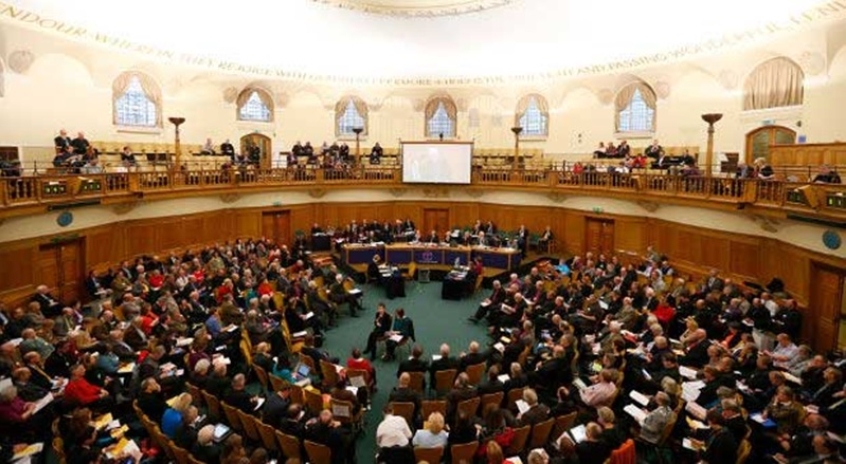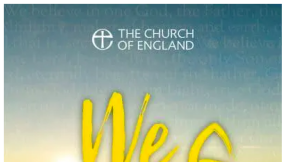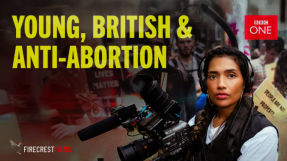
Church of England bishops were grilled at Synod on Wednesday about new guidance on services of welcome for transgender people.
Bishops came under pressure from Synod members concerned that the Church is departing from its historic position on gender and human sexuality.
Andrea Minichiello Williams, Synod member for Chichester and head of Christian Concern, asked whether bishops planned to follow up the recent controversial guidance on transgender baptismal services with guidance 'to affirm and welcome those who wish to detransition to their biological gender'.
Bishop Hardman answered that the existing liturgy could be used on 'many, many, many occasions' , including for those who want to detransition, and that there was 'no reason at all why the affirmation of baptismal vows could not be used by somebody who is deciding that they wish to reverse that decision'.
'The House of Bishops hasn't issued guidance on transitioning,' she added.
Several Synod members asked whether the bishops should have waited until the completion of the Church of England's Living in Love and Faith (LLF) project that is considering Christian perspectives on relationships, marriage and sexuality. The results of the project are due to be published next year.
Dr Ian Paul, who sits on the Archbishops' Council, questioned why the House of Bishops had not deferred issuing guidance on transgender services of welcome until after the completion of the LLF project 'given the enormous complexities of the question and given that the Synod motion last year was not asking for provision but simply asking for consideration as to whether provision should be made at this point'.
The Bishop of Coventry, the Rt Rev Christopher Cocksworth, said that the pastoral guidance was a response to the General Synod debate on provision for transgender people and that it was intended to exist 'alongside' the LLF project.
'The decision as far as I understand it was made not to issue a new liturgy of any sort, not to seek to develop a liturgy for transitioning, but to provide an opportunity for people to reaffirm their baptismal faith at a certain point in their lives,' he said.
The Bishop of Willesden, the Rt Rev Pete Broadbent, said Church of England priests were still at liberty to choose which services they held in their churches and could therefore decline to host a service of welcome for a transgender person.
'The service of the affirmation of baptismal faith is a discretionary service,' he said.
He went on to defend the guidance and affirm that there were no plans to withdraw it.
'All we're doing at the moment is saying, those who have clearly stated and present before us as trans are to be welcomed in church. A way in which do that is by using the provision as liturgy,' he said.
He continued, 'Let's emphasise that there has been no change in liturgy. This is guidance on how one might use a particular affirmation. I don't think I accept again the premise that we have changed anything of our understanding.'
Challenged again on the guidance, he commented: 'This is a way of celebrating with people something that is a change in their lives which they want to give thanks to God for but where they are also saying, "I place myself firmly in the context of being somebody who knows myself to be made new in Jesus Christ and I do that because of my baptism and that's what I'm reaffirming."
'That's the nature of the service. Nothing at all has changed from the liturgy which we espouse.'
Asked to clarify whether the service was intended to 'mark the transition' of a person to a new gender, the bishop replied that it could be used for 'people who come to us in a diversity of pastoral circumstances where lifechanging things have happened to them and they've experienced the love of Christ in a new way and they want to do so'.
He said: 'This service is one I use with a whole heap of different sorts of people. One of those contexts and possibilities is someone who's transitioned and who wishes to give thanks for their new identity.
'That's the context in which I believe the service should be used.'
The guidance issued by the House of Bishops last December formally commends the incorporation of the existing rite for the Affirmation of Baptismal Faith into services of welcome for transgender people.
It is suggested that services have a 'celebratory character' and include elements such as water and oil. Clergy are also advised to address trans people by their chosen name and use a selection of Scripture readings.
Suggested readings include Genesis 17.1–7 and 15–17 where God changes the name of Sarai to Sarah, and 2 Corinthians 5.14–21 which describes a believer being a new creation in Christ.
The guidance has encountered huge opposition from members of the clergy, with over 3,000 signing an open letter detailing 'significant issues' with the document.
They argue that the guidance is a 'misuse' of baptismal liturgy and rejects physical differences between male and female without providing theological justification.
'Although reaffirmation of baptismal vows might well be appropriate at certain seasons of life, it should primarily be focussed on celebrating new life in Christ rather than a new situation or circumstance, as set out in Common Worship: Christian Initiation, and should always centre on salvation, repentance and faith rather than "unconditional affirmation",' the letter states.













